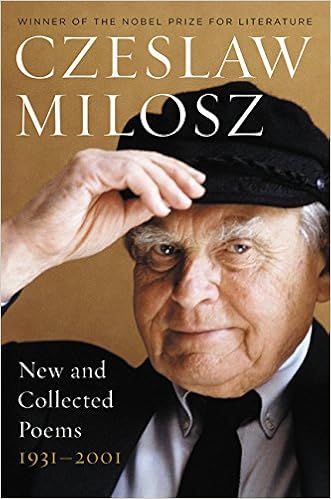
"Undoubtedly, one comes closer to the truth when one sees history as the expression of the class struggle rather than a series of private quarrels among kings and nobles. But precisely because such an analysis of history comes closer to the truth, it is more dangerous. It gives the illusion of full knowledge; it supplies answers to all questions, answers which merely run around in a circle repeating a few formulas."
Czeslaw Milosz
Wikiquote
The Great Polish Poet And Nobel Laureate Czesław Miłosz On Love
Maria Popova, Brain Pickings
Perhaps the greatest trial of love, and its greatest triumph, is to unmoor yourself from your longings and refuse to constrict the other with the dictate of your unmet needs — to accept that love, to the extent that it is real, must come unbidden. It cannot be obtained by ultimatum or negotiation; it is not subject to demand; it must flow freely or it doesn’t flow at all. And yet, though befriending our neediness may be essential to happiness, how do we keep ourselves from constricting love with the cycle of insatiable need?
In tussling with this elemental question, I have found myself returning again and again to two complementary perspectives — the great Vietnamese Zen teacher Thich Nhat Hanh’s assertion that “to love without knowing how to love wounds the person we love,” built upon his foundational teaching that “understanding is love’s other name”; and poet Nikki Giovanni’s insistence in her forgotten conversation with James Baldwin that “if you don’t understand yourself you don’t understand anybody else.” We might feel that such an understanding calls for crouching closer and closer to its subject, be it self or other, in order to examine it with narrow focus and shallow depth of field, but this is a misleading intuition — the understanding of love is an expansive understanding, requiring us to zoom out of our habitual solipsism so as to regard ourselves and the object of our love from a great distance against the backdrop of universal life.
Nothing articulates this notion more beautifully than a spare, profound poem by the Nobel-winning Polish poet, essayist, translator, diplomat, and dissident Czesław Miłosz (June 30, 1911–August 14, 2004), found in his indispensable New and Collected Poems: 1931–2001 (public library).
LOVE
by Czesław MiłoszLove means to learn to look at yourself
The way one looks at distant things
For you are only one thing among many.
And whoever sees that way heals his heart,
Without knowing it, from various ills.
A bird and a tree say to him: Friend.Then he wants to use himself and things
So that they stand in the glow of ripeness.
It doesn’t matter whether he knows what he serves:
Who serves best doesn’t always understand.
Complement with Shel Silverstein’s lovely illustrated allegory for the simple secret of love, Rainer Maria Rilke on what it really means to love, and philosopher Martha Nussbaum on how you know whether you love somebody, then revisit Miłosz’s compatriot and fellow Nobel-winning poet Wisława Szymborska on great love.

No comments:
Post a Comment